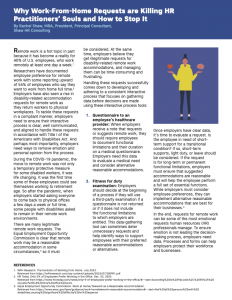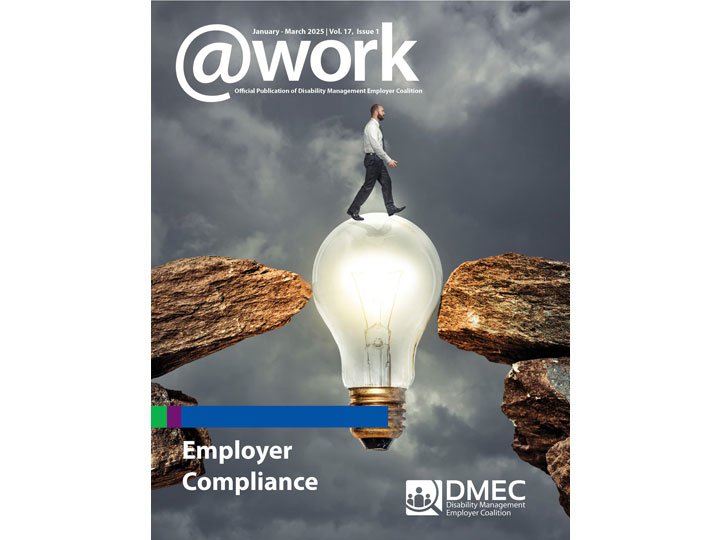Disabled Workforce column
Why Work-From-Home Requests are Killing HR Practitioners’ Souls and How to Stop It
By Rachel Shaw, Principal Consultant and Founder, Shaw HR Consulting
@Work Magazine, February 2025
Remote work is a hot topic in part because it has become a reality for 40% of U.S. employees, who work remotely at least one day a week.1
Researchers have documented employee preference for remote work with some reporting upward of 54% of employees who say they want to work from home full time.2 Employers have also seen a rise in disability-related accommodation requests for remote work as they return workers to physical workplaces. To tackle these requests in a compliant manner, employers need to ensure their interactive process is clear, well communicated, and aligned to handle these requests in accordance with Title I of the Americans with Disabilities Act. And perhaps most importantly, employers need ways to remove emotion and personal opinion from the process.
How can employers remove emotion and personal opinion from the accommodation request process to ensure compliance?
During the COVID-19 pandemic, the move to remote work was not only a temporary protective measure for some disabled workers, it was life changing. It was the first time some of these employees could see themselves working to retirement age. So after the pandemic, when employers started asking everyone to come back to physical offices a few days a week or full time, some people with disabilities asked to remain in their remote work environments.
There are many legitimate remote work requests. The Equal Employment Opportunity Commission is clear that remote work may be a reasonable accommodation in some circumstances,3 so it must be considered. At the same time, employers believe they get illegitimate requests for disability-related remote work accommodations, and managing them can be time-consuming and frustrating.
Handling these requests successfully comes down to developing and adhering to a consistent interactive process that focuses on gathering data before decisions are made using these interactive process tools:
- Questionnaire to an employee’s healthcare provider: When employers receive a note that requests or suggests remote work, they should require employees to document functional limitations and their duration on a medical questionnaire. Employers need this data to evaluate a medical need and consider alternative reasonable accommodations.
- Fitness for duty examination: Employers should decide at the beginning of a process if they will use a third-party examination if a questionnaire is not returned or if it does not include the functional limitations to which employers are entitled. This data-gathering tool can sometimes deter unnecessary requests and help identify ways to support employees with their preferred reasonable accommodations or alternatives.
Once employers have clear data, it’s time to evaluate a request. Is the employee in need of short-term support for a transitional condition? If so, short-term supports, light duty, or leave should be considered. If the request is for long-term or permanent functional limitations, employers must ensure that suggested accommodations are reasonable and will help the employee perform a full set of essential functions. While employers must consider employee preferences, they can implement alternative reasonable accommodations that are best for their businesses.4
In the end, requests for remote work can be some of the most emotional requests human resources (HR) professionals manage. To ensure emotion is not leading the decision-making process, employers need data. Processes and forms can help employers protect their workforce and businesses.
Resources:
- WFH Research. The Evolution of Working from Home. July 2023. Retrieved from https://wfhresearch.com/wp-content/uploads/2023/07/SIEPR1.pdf
- HR Today. Only 5% of Employees Prefer Working in the Office. Dec. 22, 2023. Retrieved from https://www.hrotoday.com/news/only-5-of-employees-prefer-working-in-the-office/#:~:text=According%20to%20FlexJobs%2C%2095%25%20of,prefer%20full%2Dtime%20office%20work.
- Equal Employment Opportunity Commission. Work at Home/Telework as a Reasonable Accommodation. Retrieved from https://www.eeoc.gov/laws/guidance/work-hometelework-reasonable-accommodation#:~:text=Not%20all%20persons%20with%20disabilities,causing%20significant%20difficulty%20or%20expense





